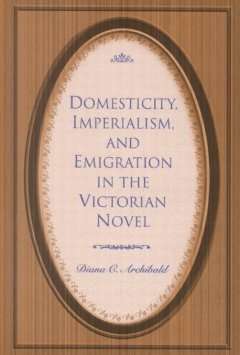Domesticity, Imperialism, and Emigration in the Victorian Novel

Editorial University Of Missouri Press
Fecha de edición diciembre 2009
Idioma inglés
EAN 9780826214003
Libro
Resumen del libro
During the nineteenth century, as millions of British citizens left for the New Worlds, hearth and home were physically moved from the heart of the empire to its very outskirts. In Domesticity, Imperialism, and Emigration in the Victorian Novel, Diana Archibald explores how such demographic shifts affected the ways in which Victorians both promoted and undermined the ideal of the domestic woman. Drawing upon works by Elizabeth Gaskell, Anthony Trollope, Samuel Butler, Charles Dickens, Charles Reade, and William Makepeace Thackeray, the author shows how the ideals of womanhood and home promoted by domestic ideology in many ways conflict with the argument in favor of immigration to imperial destinations.
According to Coventry Patmore and John Ruskin, and some of their contemporaries, woman's natural domain is the home, and a woman's fulfillment lies at the hearthside. But would any hearth do as long as it was hallowed by the presence of a domestic goddess, or was this Victorian definition of home more discriminating? Although the ideal of the domestic woman was certainly affected by these mass movements, in many texts the definition of her becomes narrow and unattainable, for she must not only be an angel, but she must also be English and remain at home.
A rather predictable pattern emerges in almost every Victorian novel that encounters the New Worlds: if an English hero is destined for a happy ending, he either marries an English angel-wife and brings her with him to the New World or, more often, abandons thoughts of settling abroad and returns to England to marry and establish a home. This pattern seems to support the supposedly complementary ideologies of domesticity and imperialism. England, according to imperialist dogma, was the righteous center of a powerful empire whose mission was to civilize the rest of the world.








